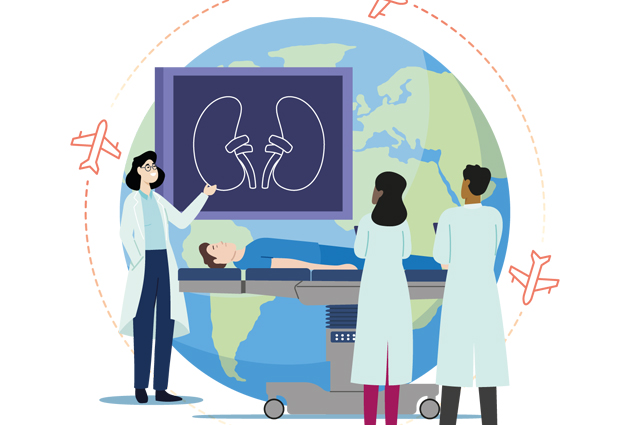Nephrology Recognized as Separate Branch of Medicine in Mauritius
In August 2021, the Renal Association of Mauritius announced on social media that the Mauritian Ministry of Health and Wellness (MOHW) had recognized nephrology as a separate specialty from internal medicine in Mauritian hospitals. This momentous decision was initiated in response to the dedicated work of many stakeholders over several decades and the Renal Association’s awareness-raising activities.
The Renal Association of Mauritius, an ISN Collective-Member Society, provided the ISN with some background context to this significant development:
Nephrology-related medical care was carried out in Mauritius by local physicians until 2001 when the role of nephrologists was first recognized in the country. Mauritius launched its first live kidney transplant program in public hospitals in 1992, and hemodialysis (HD) began to be carried out in 1995.
Although all five regional hospitals were equipped with a dialysis unit by 2003, only one nephrologist, Dr. Mohungoo, was active in the public health sector for many years. Inevitably, most kidney patients were cared for by general physicians.
Dr. Mohungoo comments: “l am very pleased to learn that a department of nephrology has finally come into existence in public hospitals with a consultant-in-charge. Keeping [dialysis and kidney transplant] patients alive with limited resources and staff has been a formidable challenge in the past. The Ministry [of Health and Wellness] has subsequently invested a lot to expand and improve dialysis facilities. Almost at the end of my career in the public health sector, I am indeed convinced that great progress will be achieved in due time now that nephrology has gained some autonomy.”
The number of active nephrologists increased steadily from 2012 onwards, but these doctors remained under the Department of Internal Medicine and required support from general physicians to run a service catering to an ever-increasing number of dialysis patients – over one in a thousand Mauritians is on dialysis.
In 2017, however, the local transplant surgeon retired and the transplant program ended. Patients are currently sent abroad for transplantation. It became increasingly evident that providing dialysis without developing a comprehensive nephrology service was equally unsustainable. These critical factors led to the country’s official recognition of nephrology as a distinct branch of medicine and the creation of a separate nephrology department.
The new department of nephrology comprises HD units in five regional hospitals and two district hospitals with a workforce of seven nephrologists, one physician with an interest in nephrology, two trainee nephrologists, and nine junior doctors.
The department takes care of:
- 1550 patients on hemodialysis,
- 175 transplant patients
- More than 2000 CKD patients under outpatient nephrology follow-up
Dr. Ip Min Wan, Sir Seewoosagur Ramgoolam National Hospital, the newly appointed consultant-in-charge in nephrology, states: “I am very honored to have been chosen to lead nephrology. I am grateful to Dr. Gaya and Dr. Mohungoo, who laid the foundations for this new department, and I applaud the Ministry (of Health and Wellness) for this momentous decision.”
He outlined plans to relaunch a kidney transplant program and peritoneal dialysis service and devise a comprehensive plan to raise public awareness and deliver prevention, early detection, timely treatment, and up-to-date tertiary care, as well as encourage patient education and empowerment. The long-term strategy includes the development of a renal registry and an active clinical research program.
However, Dr. Ip Min Wan insists that “These ideas will come to nothing if we cannot make the nephrology workforce double or even triple in size. We remain understaffed and dependent on help from our physician colleagues for out-of-hours, on-call cover. There is presently no local specialist training in nephrology or any training arrangement with overseas institutions. We appeal to the international nephrology community and our Ministry of Health and Wellness to support our vision for improved care for kidney patients.”
The ISN looks forward to continuing to work alongside the Renal Association in Mauritius to advance kidney care in the region.










